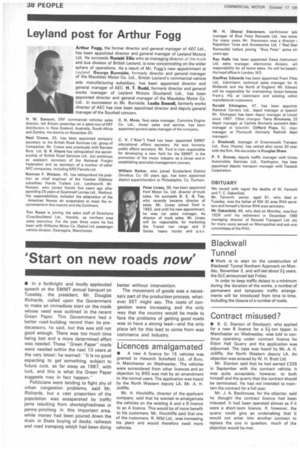'Start on new roads now'
Page 40

If you've noticed an error in this article please click here to report it so we can fix it.
• In a forthright and loudly applauded speech at the SMMT annual banquet on Tuesday, the president, Mr.. Douglas Richards, called upon the Government to make an immediate start on the roads whose need was outlined in the recent Green Paper. This Government had a better road-building record than its predecessors, he said, but this was still not good enough. There was too much time being lost and a more determined effort was needed. These "Green Paper" roads were needed within the next 10 years at the very latest: he warned: "It is no good expecting to get something, subject to future cuts, as far away as 1987. with luck, and this is what the Green Paper suggests may in fact happen."
Politicians were tending to fight shy of urban congestion problems, said Mr. Richards, but a vast proportion of the population was exasperated by traffic jams resulting from shortsightedness or penny-pinching in this important area, while money had been poured down the drain in State buying of docks, railways and road transporx which had been doing better without intervention.
The movement of goods was a necessary part of the production process, whatever SET might say. The costs of congestion were increasing and the only way that the country would be made to face the problems of getting good roads was to have a strong lead—and the only place left for this lead to come from was commerce and industry.
Licences amalgamated
• A new A licence for 15 vehicles was granted to Haworth Schofield Ltd., of Bury, in Manchester on Wednesday. The vehicles were surrendered from other licences and an objection by BRS was met by an amendment to the normal users. The application was heard by the North Western deputy LA, Mr. A. H. Jolliffe.
Mr. H. Hinchliffe, director of the applicant company, said that he wanted to amalgamate the vehicles on the existing A and a B licence to an A licence. This would be of more benefit to his customers. Mr. Flinchliffe said that one of the customers, R. Wild Ltd., was increasing his plant and would therefore need more vehicles.




























































































































